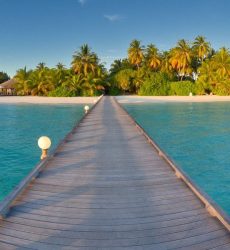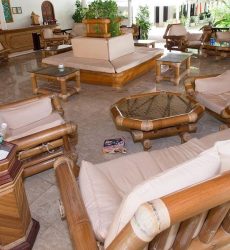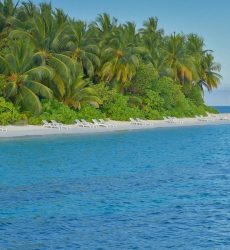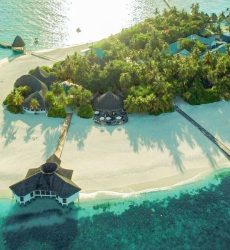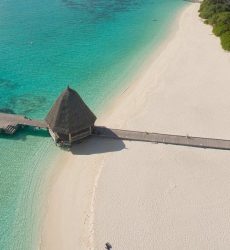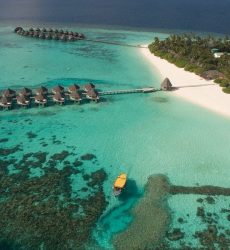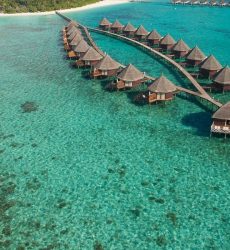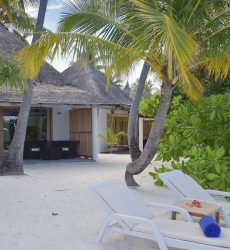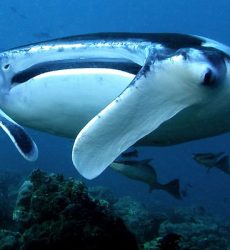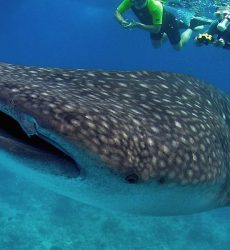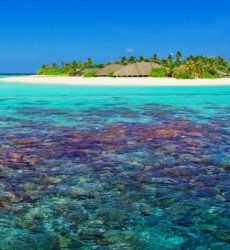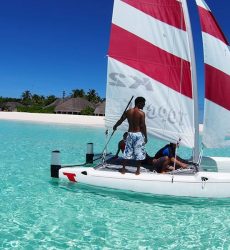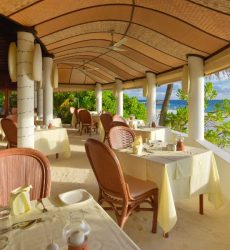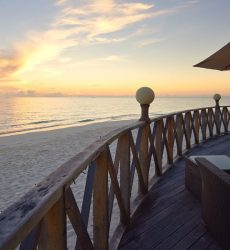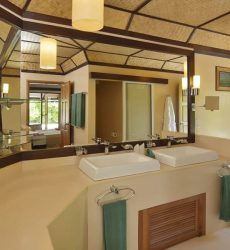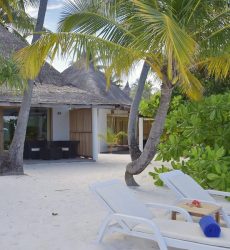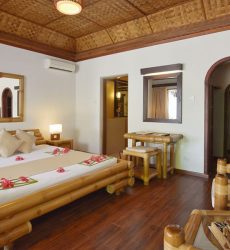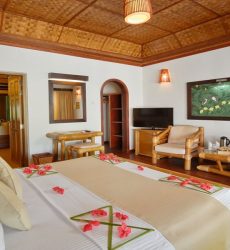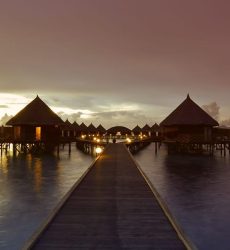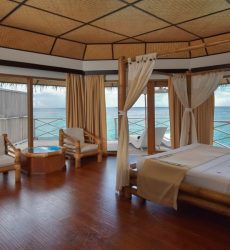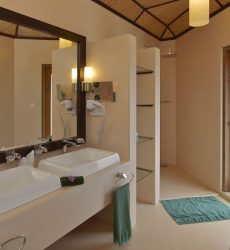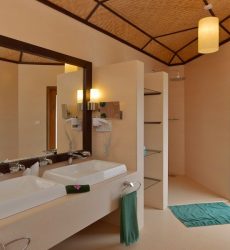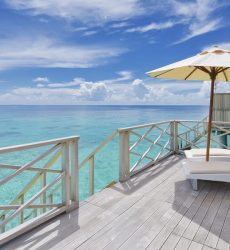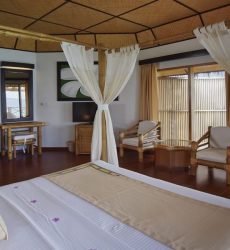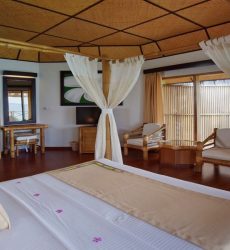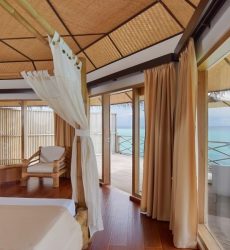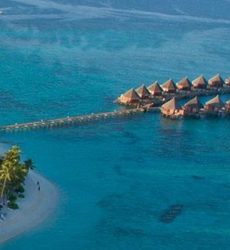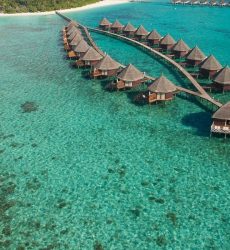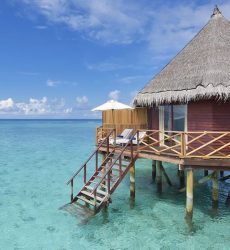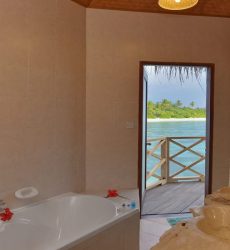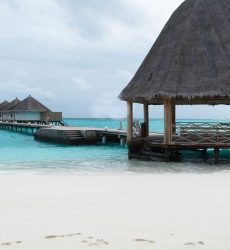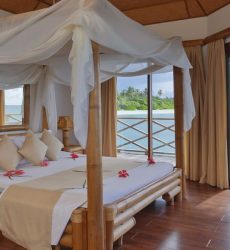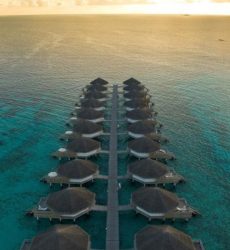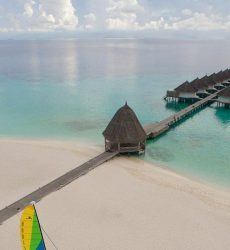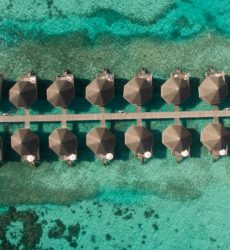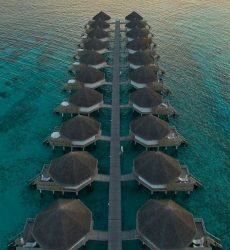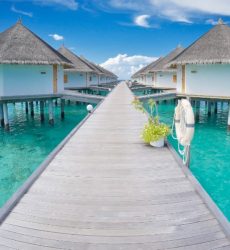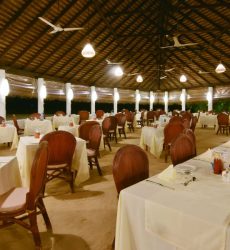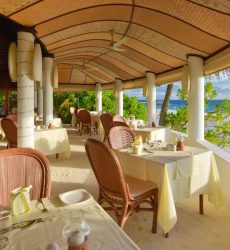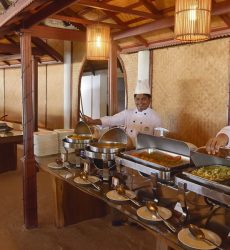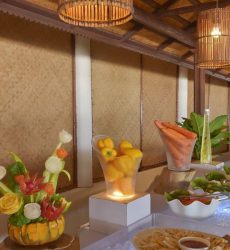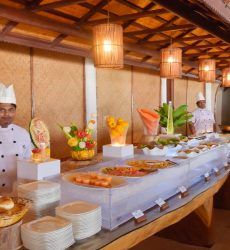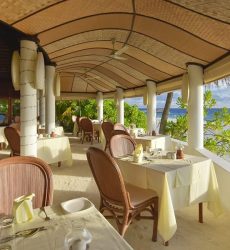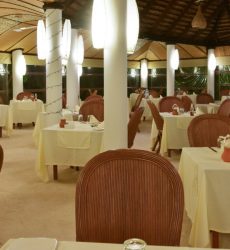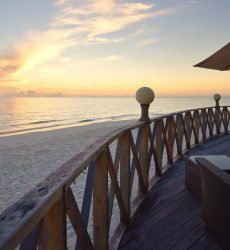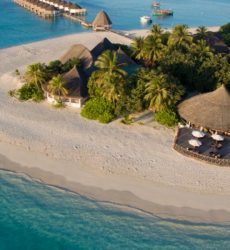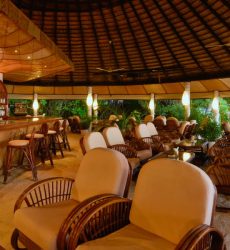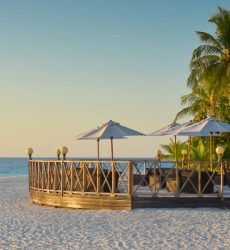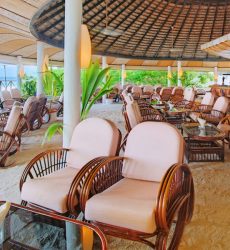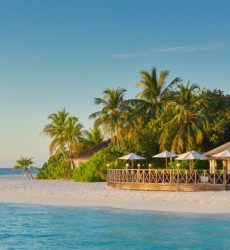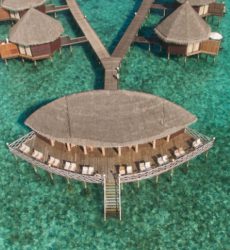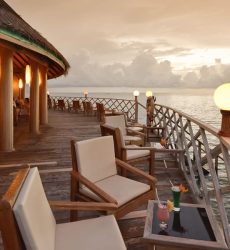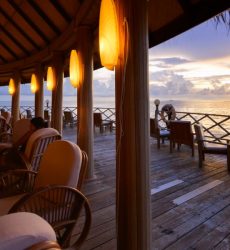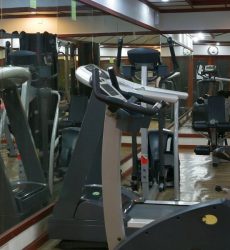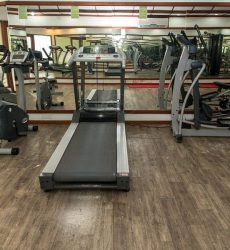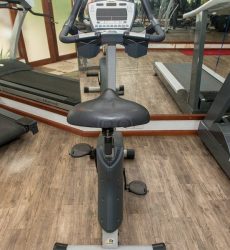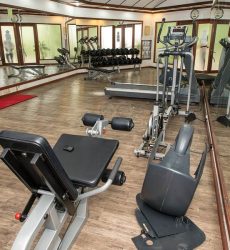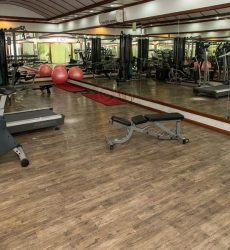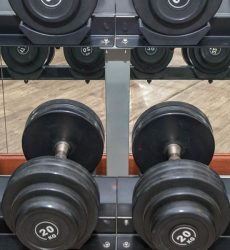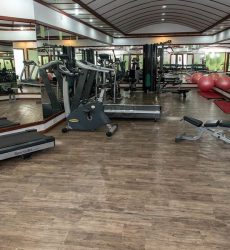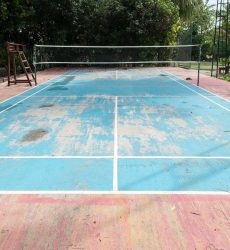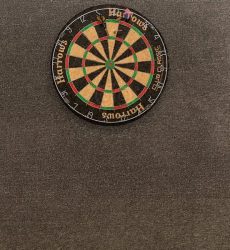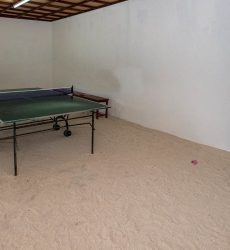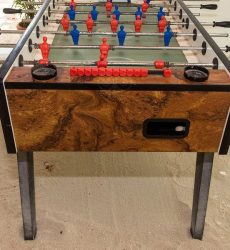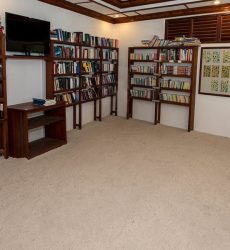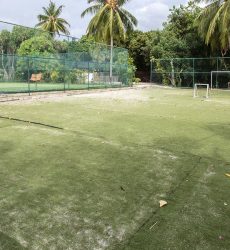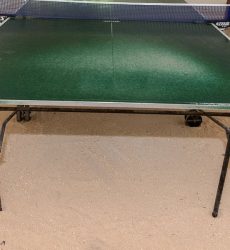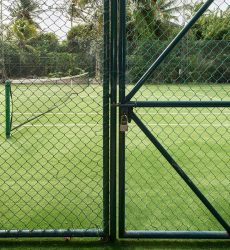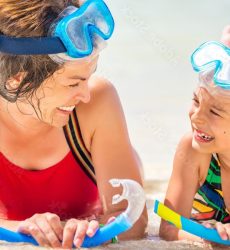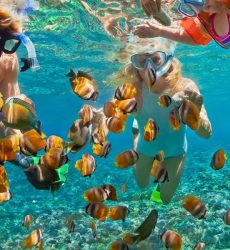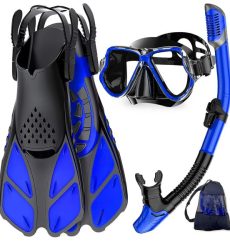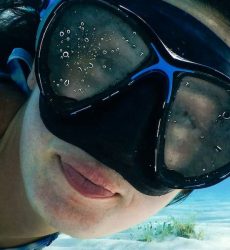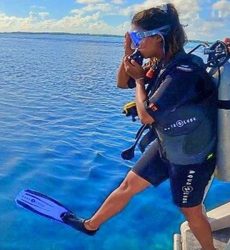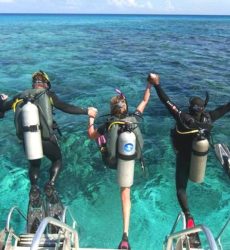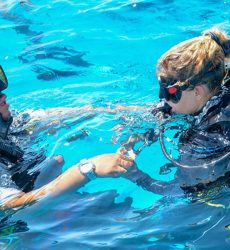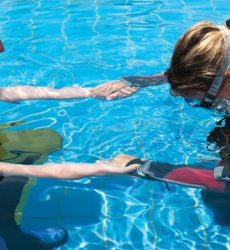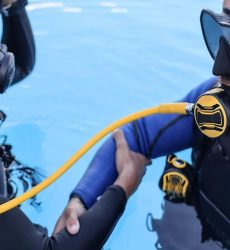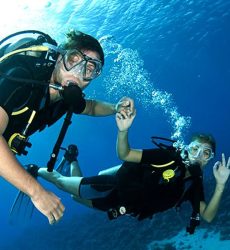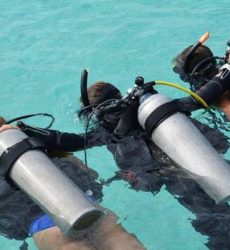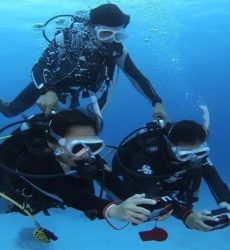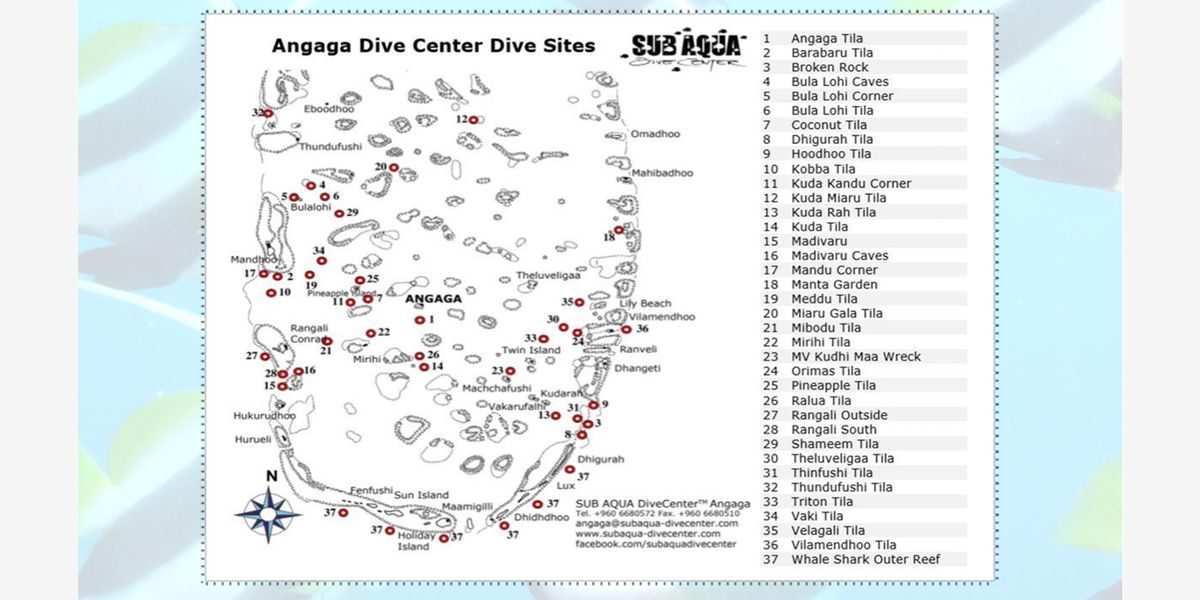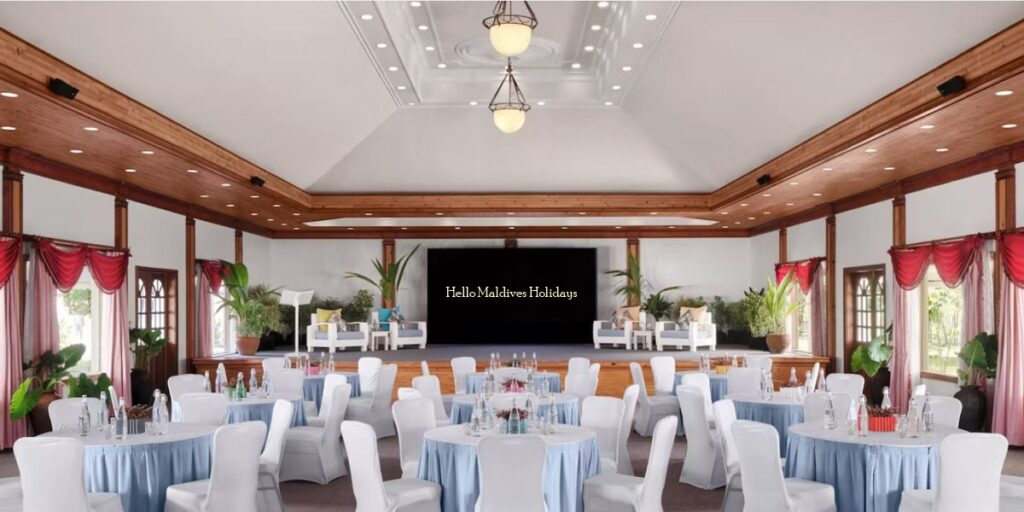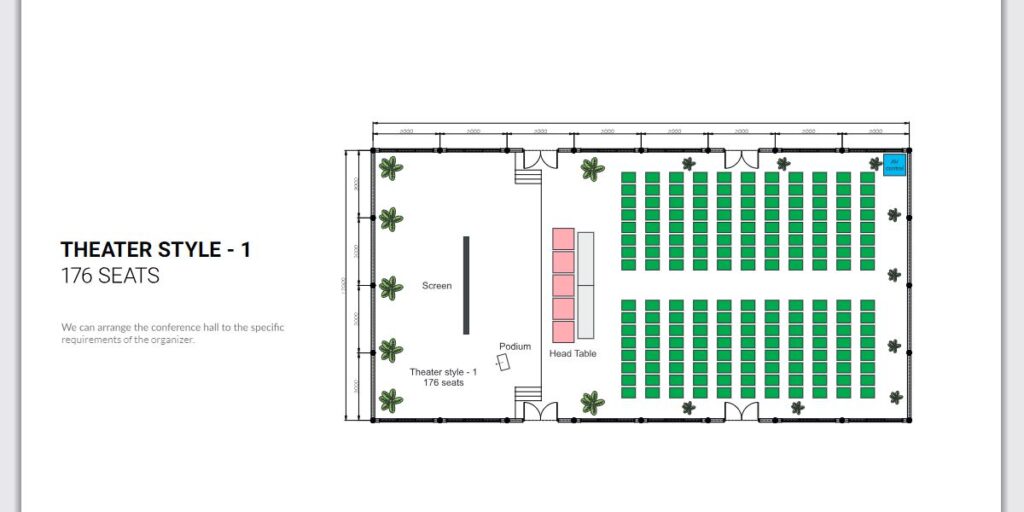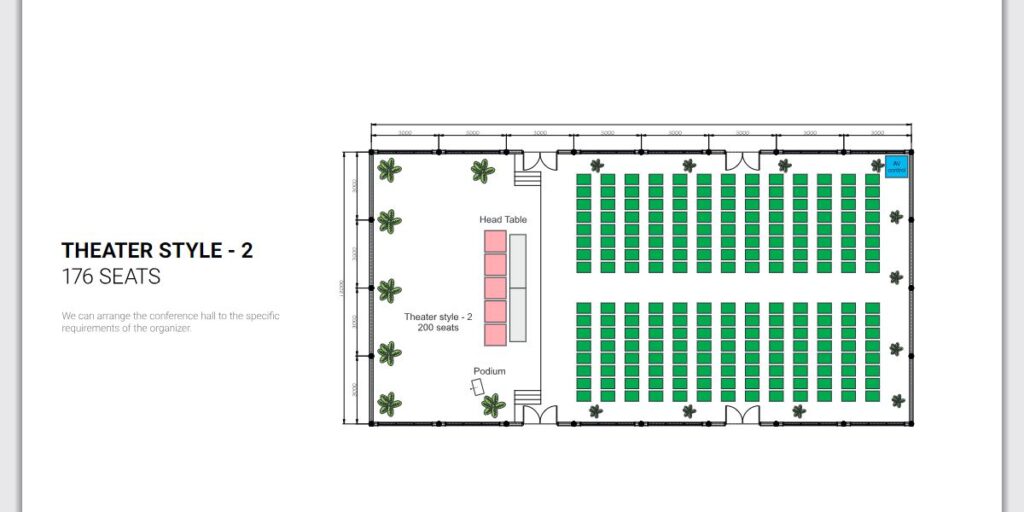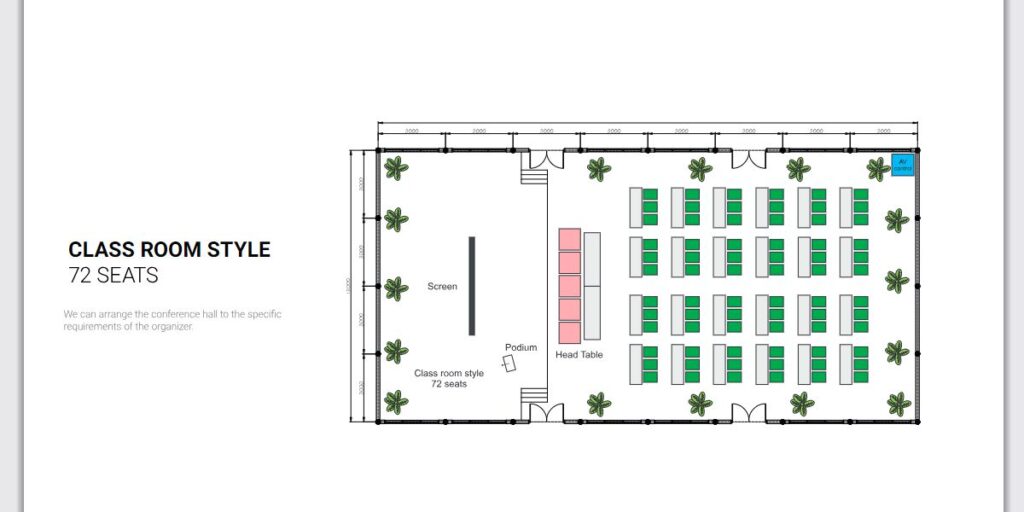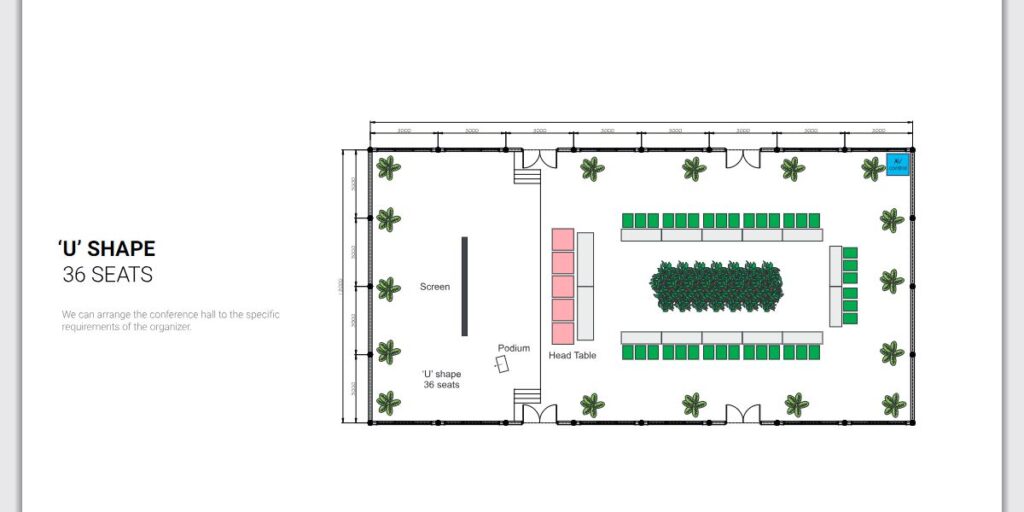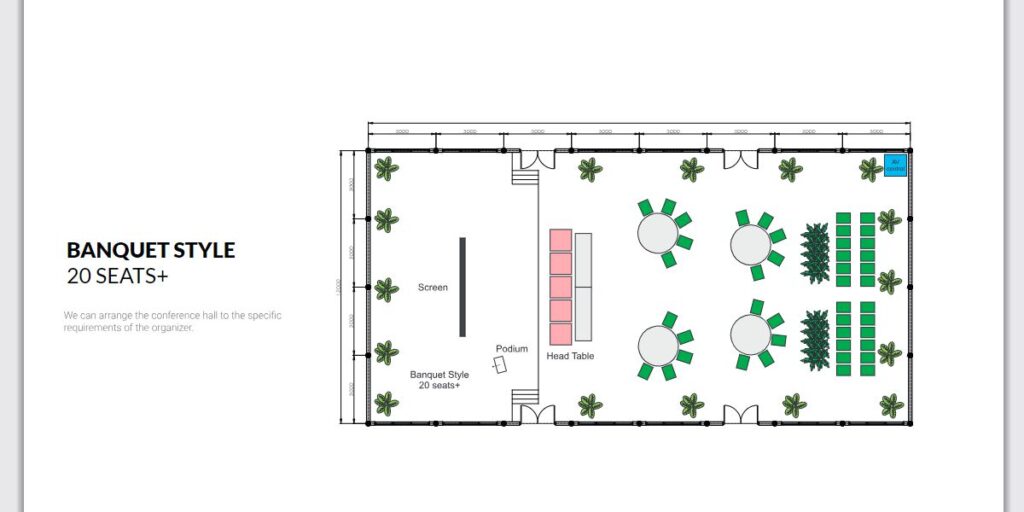+ (960)757-7700
- Alifu Dhaalu Atoll
- Beds: 180
- Rooms: 94
- 25 min. SEA PLANE transfer from Velaana Int'l A'port
- Half Board, Full Board, All-Inclusive & Half Board PLUS All-Inclusive
Angaga Island Resort & Spa is located in the heart of South Ari Atoll. South Ari Atoll is mostly known for its rich marine life with best diving points. The island sourrounded by white powdery sandy beach and crystal clear lagoon and house reef full of colorful fish species which is heaven for snorkeling and diving. The size of the island is approximately 42372 square meters. Distance from Male (Velaana) International Airport is about 85 km and it takes about 25 minutes to reach the island by Seaplane.
Conditions:
- Check-In: from: 2:00 pm (1400 hours) of the Arrival Date
- Check-Out: from 12:00 pm (1200 hours) of the Departure Date.
- EARLY CHECK-IN:
- Prior to 04:45 hrs – Book from previous day.
- 04:45 – 08:00 hrs – 50% of overnight room rate.
- 08:00 hrs onwards – FREE, subject to availability.
- LATE CHECK-OUT:
- 12:00 – 18:00 hrs – 50% of overnight room rate.
- Beyond 18:00 hrs – Overnight room rate.
- NOTE: Late Check-Out untill 1400 hrs could be provided on complimentary basis subject to availability on departure day. However, for guaranteed late check-out, reservation should be confirmed with Late Check-Out as per the above details.
- Cancellation / Payment: Cancellation and prepayment policies vary according to accommodations type. Please contact us with the dates of your stay and check what conditions apply to your preferred room category.
- Children & Beds: Children of all ages are welcome.
- No Age Restriction: There is no age requirements for Check-In.
- Pets: Pets are NOT allowed.
To Consider:
- DOMESTIC AIR TRANSFER
- Arrival: International flight must land at or before: 03:15 pm (1515 hours)
- Departure: International flight must depart at or after 09:00 am (0900 hours).
- CHILD Policy
- The ages for considering Infants and Children are as follows:
- INFANT – from 00 to 01.99 years
- CHILD – from 02 to 11.99 years
- The Child rates are applicable based on the Child’s age at the arrival date to the resort.
- Child Rates are valid for children sharing rooms with parents.
- Children below 1.99 years will eat FREE based on the rules and meal-plan accompanied by an adult, excluding alcoholic beverages. And a mandatory Green-TAX of USD 6/- per child per night will be charged.
- Parents must sign a liability release to accommodate children in Pool Villas and Overwater Villas.
- The ages for considering Infants and Children are as follows:
- GENERAL Policies:
- Credit-Card holder name and the booking-holder name should be same.
- Please present the same Credit-Card used to guarantee your booking when Check-In, making the payment at the hotel. Please note that property may contact the Card-holder for verification purposes.
- Due to safety and privacy concerns the operation of unmanned aerial systems or drones by any of guests including model aircraft by recreational users and hobbyists is prohibited.
- If the guests pay the Green-TAX and transfer using different Credit Card, the property will do USD 1 transaction and void for verification purposes at the time of Check-In.
- All transfers to the Resort will be by Domestic Flight (between Velaana International Airport and Maamigili Airport), followed by a 5 minute Boat ride to/from the Resort.
- Checked in Bagagge allowance of 25kgs and hand luggage allowance of 5 kgs is entitled per person. Excess baggage to be borne by clients and to be settled at the Airline counter at the rate of USD 2/- per kg plus taxes.
- NOTE: Air transfer rates and excess baggage charges are subject to change upon revision by the carrier.
- COMPLIMENTARY OFFERINGS
- Meet and Greet service on arrival at the Airport.
- Welcome refreshment on arriva to the Resort.
- The Resort will provide a drinking water bottle (1 ltr) per person per day in the room.
- Free drinking water at mealtimes served by glass.
- Tea/Coffee making facilities in the room (1 set per day)
- Free WiFi in all rooms.
- Gymnasium (excluding personal trainer)
- Land Sports: (excluding coach and instructors); Badminton, Snooker/Billiards, Table Tennis, Dart, Beach Volleyball, Squash, Daylight Tennis, Basketball.
- HONEYMOONERS: A bottle of Sparkling Wine and a Fruit Basket for Honeymooners (for marriages within the last 12 months of arrival date).
- WEDDING ANNIVERSARIES: A bottle of Sparkling Wine and a Cake for wedding anniversaries celebrated at the Resort.
- BIRTHDAYS: A Birthday Cake and a Bottle of Wine for Birthdays celebrated at the Resort.
- NOTE: All Honeymooners and Wedding Anniversary information shall be notified at the time of booking or specified in the service voucher. In addition Guests are required to present marriage Certificates at the time of Check-In to the Resort.
Angaga Island accommodation is designed to make holidays in the Maldives more authentic & tropical, where you see more detached, thatched roof bungalows. With panoramic views, ocean breezes and azure waters beneath your feet will make you feel more nature-oriented.
Thus the bungalows are simple, natural and very much Maldivian. The island has two-style of bungalows (Beach Bungalow & Water Bungalow) onto 3 categories. They are; Superior Beach Bungalows, , Superior Water Bungalows and Premium Water Bungalows.
Superior BEACH Bungalows
TROPICAL BEACH BUNGALOWS
These are Beach Bungalows with Superior facilities. These bungalows are beach front.
Amenities: Hot & Cold Fresh Water | Bathtub with Separate Shower | Air Condition | Mini Fridge | Satellite TV with Flat Screen | Hair Dryer | Telephone | Tea/Coffee making facilities | WC | Luxury Bamboo Furniture | Sun Chair | Bathroom Amenities (Bathrobe, Shampoo, Conditioner & Shower Gel) | Free WiFi.
Features: 45 square metres | sleeps 3 Adults or 2 Adults + 1 child | Beach Access
PACKAGE Starts on HALF BOARD for 2 pax @ US$ 333 + to US$ 399 + per Night
Superior WATER Bungalows
TROPICAL WATER BUNGALOWS
These are Water Bungalows with Superior facilities. These bungalows are on the lagoon on stilt.
Amenities: Hot & Cold Fresh Water | Bathtub with Separate Shower | Air Condition | Mini Bar | Satellite TV with Flat Screen | Hair Dryer | Telephone | Tea/Coffee making facilities | WC | Luxury Bamboo Furniture | Sun Chair | Bathroom Amenities (Bathrobe, Shampoo, Conditioner & Shower Gel) | Free WiFi, Glass Bottom Table | Backdoor to the private sundeck | Direct Access to Lagoon.
Features: 65 square metres | sleeps 3 Adults or 2 Adults + 1 child | Lagoon Access
PACKAGE Starts on HALF BOARD for 2 pax @ US$ 414 + to US$ 499 + per Night
PREMIUM WATER Bungalows
TROPICAL WATER BUNGALOWS
These are Water Bungalows with Premium facilities. These bungalows are on the lagoon on stilt with lagoon access.
Amenities: Hot & Cold Fresh Water | Bathtub with Separate Shower | Air Condition | Mini Fridge | Satellite TV with Flat Screen | Hair Dryer | Telephone | Tea/Coffee making facilities | WC | Luxury Bamboo Furniture | Sun Chair | Bathroom Amenities (Bathrobe, Shampoo, Conditioner & Shower Gel) | Free WiFi, Glass Bottom Table | Backdoor to the private sundeck | Direct Access to Lagoon.
Features: 78 square metres | sleeps 3 Adults or 2 Adults + 1 child | Lagoon Access
PACKAGE Starts on HALF BOARD for 2 pax @ US$ 424 + to US$ 525 + per Night
ANGAGA Island Resort, The Maldives / Dinning
With one main restaurant on the island serving international and authentic Maldivian cuisine, Angaga dinning is all about delighting the senses. Enjoy fragrant, flavorful curries made with seafood caught fresh that morning.
Dolphin Restaurant
This main restaurant caters to please all tastes, be it Italian, Japanese, Chinese, Indian, Western or authentic & traditional Maldivian cuisine for those adventurous enough. Buet style breakfast, lunch and dinner features exquisite creations guaranteed to tantalize your taste buds. The limitless choices available in buet style for breakfast, lunch & dinner are crafted tantalize your taste buds.
Paired with the mesmerizing view of the sunlit beach and the lull of the lazy waves, every meal is bound to be a pleasurable experience.
OPENING HOURS: Breakfast: 7:30 – 10:00 am | Lunch: 12:30 – 14:00 pm on Friday: 13:00 – 14:30 | Dinner: 19:30 – 21:00 pm
Beach BAR
Sip your tea / coffee or your favorite cocktail from the menu and experience the mouth watering A la Carte dishes prepared by the Chefs. To enjoy the time, while having your favorite drinks, they have some exciting board/card games that you could play with your friends and loved ones.
Moreover live band performs in the Main Bar / Coffee Shop once every week.
OPENING HOURS: 08:00 – 00:00 am (Untill Last Guest Leaves. | All-Inclusive package drinks are served untill midnight.
Sundown BAR
Experience some of the best signature Cocktails / Mocktails of Angaga Island while spending relentless time on seeing the sunset at the far horizon of the Indian Ocean.
This could be the right place to start your night on the right note with chilled beats and a spectacular starlit sky, as signature cocktails by the mixologists turns anytime you’re at bar into a celebration of vibrant fun over water.
OPENING HOURS: 08:00 – 00:00 am (Untill Last Guest Leaves). | All-Inclusive package drinks are served untill midnight.
Paddle across the island in a kayak. Ride the early morning breeze to wind-surf across the lagoon. Enjoy a relaxing catamaran sail to a nearby island. Balance on a stand up paddle board. A full menu of water sport activities and facilities to experience and indulge in as part of your Maldives holiday! The adventure is your to be had.
Water Sports | Excursions | Fitness Centre & Gym | Sports & Activities
Water Sports
Water Sports is one of the major and adrenaline pumping activity in every resort island of Maldives. Especially for places like Angaga where you get beautiful lagoons with sandy bottoms.
OPENING HOURS: 08:30 am – 12:00 pm – 14:00 pm – 17:00 pm
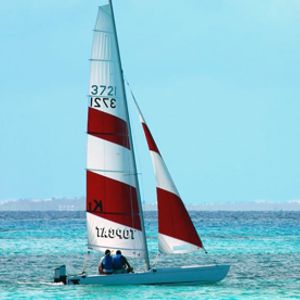
Catamaran Sailing
4 - Activities SPECIAL PACKAGE PRICE for (Catamara Sailing - 35 minutes) + (Canoe - 30 minutes) + (Fun Tube Ride - 10 minutes) + Stand Up Paddle Board - 30 minutes). ============================ * US$ 60/- per person for 4 or more participants * US$ 80/- per person for 2 or 3 participants (* All prices are subject to 10% Service Charge + 16% T-GST.)
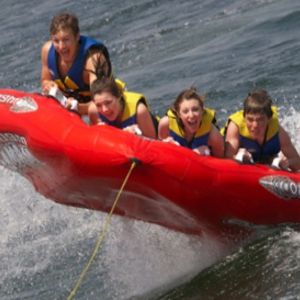
Fun Tube Ride
4 - Activities SPECIAL PACKAGE PRICE for (Catamara Sailing - 35 minutes) + (Canoe - 30 minutes) + (Fun Tube Ride - 10 minutes) + Stand Up Paddle Board - 30 minutes). ============================ * US$ 60/- per person for 4 or more participants * US$ 80/- per person for 2 or 3 participants (* All prices are subject to 10% Service Charge + 16% T-GST.)
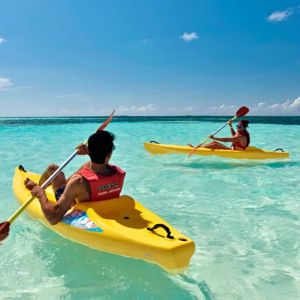
Canoeing
4 - Activities SPECIAL PACKAGE PRICE for (Catamara Sailing - 35 minutes) + (Canoe - 30 minutes) + (Fun Tube Ride - 10 minutes) + Stand Up Paddle Board - 30 minutes). ============================ * US$ 60/- per person for 4 or more participants * US$ 80/- per person for 2 or 3 participants (* All prices are subject to 10% Service Charge + 16% T-GST.)
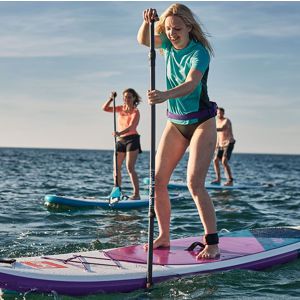
Stand Up Paddle Boarding
4 - Activities SPECIAL PACKAGE PRICE for (Catamara Sailing - 35 minutes) + (Canoe - 30 minutes) + (Fun Tube Ride - 10 minutes) + Stand Up Paddle Board - 30 minutes). ============================ * US$ 60/- per person for 4 or more participants * US$ 80/- per person for 2 or 3 participants (* All prices are subject to 10% Service Charge + 16% T-GST.)
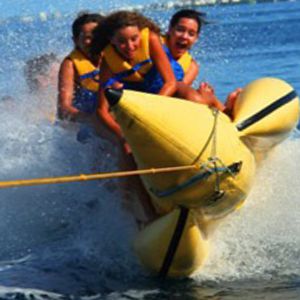
Banana Boat Ride
For a thrilling and fun-filled ride on the water, try the Banana Boat! Its like a roller coaster on the water for the whole family (capacity for upto 6 passengers) ============================ * US$ 18/- per person for 4 or more participants. (* All prices are subject to 10% Service Charge + 16% T-GST.)
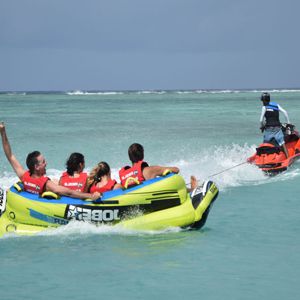
Fun Tube Ride
Hold on tight and enjoy the ride! Give it a try: get pulled behind the jetskii on one of the fun tubes. You tell the driver how fast you dare to go! ============================ * US$ 25/- per person for 2 participants. * US$ 20/- per person for 3 participants. (* All prices are subject to 10% Service Charge + 16% T-GST.)
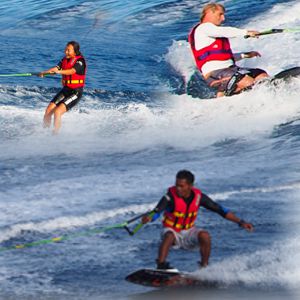
Waterskiing, kneeboarding & Wakeboarding
Never tried before? No Problem! They offer easy introductory lessons. In no time you will have the most thrilling and fun experience you can dream of on the water! ============================ * US$ 50/- per person for a 25 minute lesson, any modality. * US$ 40/- per person for a 15 minute ride, experienced personnel. (* All prices are subject to 10% Service Charge + 16% T-GST.)
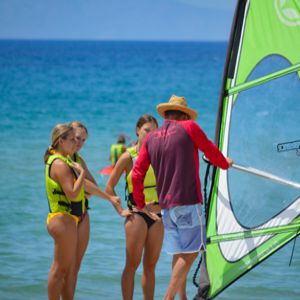
Windsurfing
We bet you always wanted to give it a try .... Now you have the chance! Learn the basics of windsurfing with the professional instructors, and sail swidtly over the blue lagoon. ============================ * Refreesher Lesson, 1.5 hours @ US$ 40/- per person | Introductory Lesson, 1 hours @ US$ 45/- per person | Board Rental, experience required @ US$ 25/- per hour (* All prices are subject to 10% Service Charge + 16% T-GST.)
Excurions & Tours to nearby Attractions @ Angaga Island
A number of exciting excursions are scheduled weekly and whenever guests have had their fill of catching rays on the beach, they are welcome to sign up for an adventure at the reception. The Guest Experiences Team is here to arrange the ideal island adventure for you, whether you join a group excursion or opt for a private experience
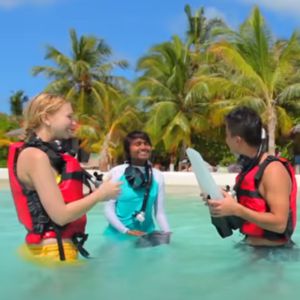
SNORKELING - Saturday & Tuesday @ 09:00 hrs - 11:00 hrs (US$ 20/- per person - minimum 08 Adults)
For those who would love to see the underwater but hesitate to take the deep plunge, snorkeling is a wonderful alternative. With just a snorkel, mask and fins you can witness the activities of the many different species of fish and marine flora and fauna on the unique Maldivian reefs.
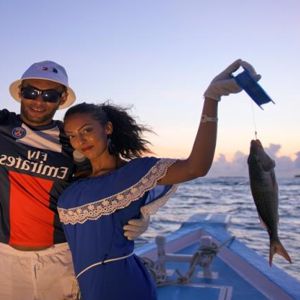
SUNSET FISHING - Monday & Friday @ 17:30hrs - 20:00hrs (US$ 20/- per person - minimum 08 Adults)
Sunset Fishing in Maldives is the most famous type of sports fishing. You can catch snappers, groupers, barracuda, jackfish and many more during sunset fishing while enjoying the sparkling breathtaking view, the rhythmic music of waves and gentle breeze amidst nature's splendor. The fish you catch will be served barbecued on the beach during the same evening.
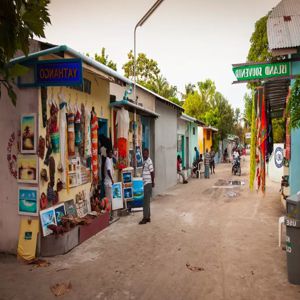
HALF DAY ISLAND HOPPING - Friday @ 14:00 hrs - 17:00hrs (US$ 20/- per person - minimum 08 Adults)
There are lot of places to see around Maldives. It will be an ultimate experience to visit a local island or a fishing village and see the Maldivians way of life. It can be said that you do not explore a local island in Maldives, your trip is incomplete. This is a wonderful opportunity to have a first-hand experience on the local life and also do some shopping.
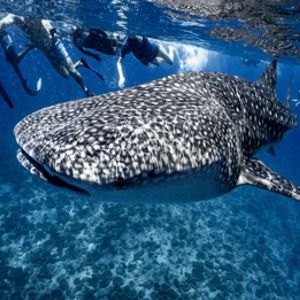
SNORKELING WITH WHALE SHARK - Sunday & Thursday @ 08:30 hrs - 12:30 hrs (US$ 55/- per person / Minimum 08 Adults)
The whale sharks that you can find in the Maldives are rather small ones measuring on average between 4 and 8 meters. These magnificent gentle giants of the ocean draw visitors to Maldives from around the globe. Exploring and swimming with the Whale-Sharks is an experience that will last with you for a life time.
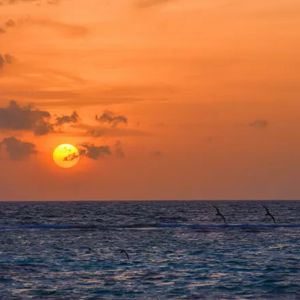
SUNSET PHOTO SAILING - Saturday @ 17:30 hrs - 18:30 hrs (US$ 25 per person / Minimum 08 Adults)
There is no better way than taking a sunset cruise to capture the magnificent vista of scarlet skies, brilliant hues of lavender and rich blue wisps of clouds as the sun is about to set. A sunset cruise in the Maldives will give you the opportunity to enjoy the sunset in all natures glory without any man made interferences shadowing the amazing sight.
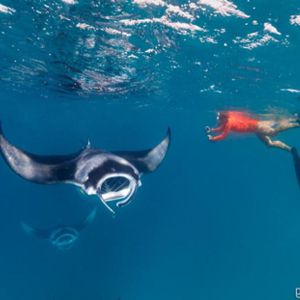
MANTA SNORKELLING - Wednesday @ 08:30 hrs - 12:30 hrs (US$ 45/- per person / Minimum 08 Adults)
Experience the excitement of seeing magnificent mantas. These creatures are found in groups, if you are lucky you will get to take pictures and swim with these gentle creatures of the ocean.
Sports & Activities
- TENNIS
Type of Tennis Court : Outdoor Grass Court
Gear Equipment : Available at Front Desk
Operating Time : 06:00 hours to 22:00 hours
_________________________________
- Volleyball
- Beach Soccer
- Badminton
Outdoor Concrete Ground
Operating Time: 06:00 am – 22:00 pm
_________________________________
- Table Tennis
- Dart Board
- Garlando Table
Operating Time: 24 hours
_________________________________
Its no secret that Spa therapies are an enhancement to life. We emphasize inner healing and the balance of mind, body and soul using a fusion of Eastern and Western philosophies and treatments set in contemporary oriental surroundings.
The treatments are designed to help you relax and rejuvenate your mind, body and soul, but most importantly you will return home with more energy, greater focus and an enhanced sense of balance.
Feel the benefits as you experience a touch of all senses at Duny Thai Spa.
Spa HOURS: 09:00 am – 20:00 pm (Last treatment begins at 19:00 pm)
Traditional Thai Massage | Royal Thai Aromatic Massage | Stone Massage | Classical Swedish Massage | Back, Neck & Head Massage | Foot Reflexology | Pre Tanning Treatment | After Sun Treatment | Moisturising Facial | Sensitive Facial | Body Polish | Body Wrap | Nail Care | Wax Treatment | A Touch of Thai | You & Me Package | Blend To Bliss

Traditional Thai Massage
(Balancing Body Energy) - 5 min, foot spa and 45 min,/85 min, muscle stretching. This non oil massage therapy was originally performed to facilitate a deeper meditation practice with the philosophy of peace. The massage focuses on muscle stretching and pressing to stimulate the natural flow of ten energy lines, which conduct and carry the energy throughout the body.
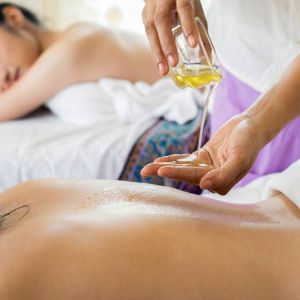
Royal Thai Aromatic Massage
(Aches & Tension Relief) - 5 min, foot Spa and 45 min,/85 min, medium to firm pressure massage with warm aromatic oil. Most people will suffer stress through pressure of everyday living. Stress is often responsible for causing tension in our muscle. Combining vigorous and soothing massage movement, this massage melts away muscular aches and tension as well as relaxes the whole body and mind.
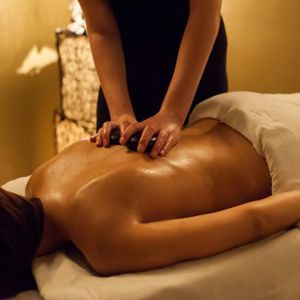
Stone Massage
(Deep Relaxation) - 5 min, foot Spa and 45 min,/85 mins, warm oil hot stone massage. This holistic ritual is a massage that helps encourage balance, comfort and well-being. It is carried out using the warm stones. This massage can discover the healing power of stones, known for their energizing properties. The heat provided by the stones will penetrate deep into the body, giving a calming and relaxing experience.
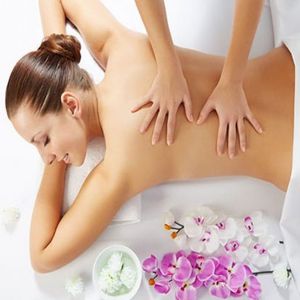
Classical Swedish Massage
(muscle relaxation) - 5 min, foot Spa and 45 min,/85 mins, medium to firm pressure massage. Uses the world-renowned classic massage techniques which release physical stress and fatigue. It combines vigorous and soothing massage movements adapted to the individuals specific areas of tension. This massage is highly effective for muscle relaxation.

Back, Neck & Head Massage
(Back Pain & Headache Relief) - 5 min, foot spa and 45 min, firming massage. Tight muscles reduce circulation, letting waste products accumulate, which can leave you feeling fatigued and sore. Plus waste products can irritate nerves, causing pain to spread. This massage can release contracted muscles, increases circulation and relaxes the nervous system. Waste products are flushed away and replaced with oxygen and nutrients.

Foot Reflexology
(Stimulates the Nervous System) - Sometimes tight muscles press on nerves, causing tingling, numbness, or main pain. This massage can help by stretching tight muscles and by applying medium pressure to specific points on the feet to stimulate the nervous system. This massage helps to relax muscle tension and boost the immune system.
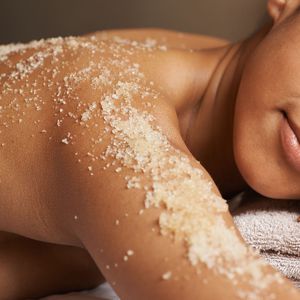
Pre Tanning Treatment
(Prepares Skin For The Tanning Process) - 5 min, foot spa and 40 min, Pre Tanning Treatment. The ideal preparation for your skin to get the most out of the sun with a well protected skin. Coconut exfoliating body scrub will remove debris while the traditional massage will help penetrate the pure virgin coconut oil into your prone to dry skin when exposed to the sun.
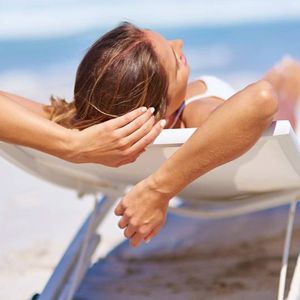
After Sun Treatment
(Soothing and Calming) - Rejuvenate your skin again after sun bathing with soothing and natural Aloe Vera after sun treatment. It has a healing effect making it an excellent choice after exposure to the sun. Give your body a wonderfully healthy glow with this special treatment that will balance your skin color and moisture your entire body.
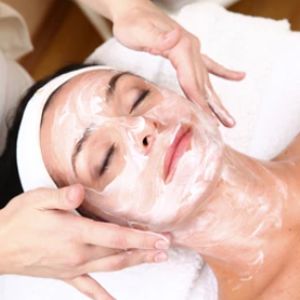
Moisturizing Facial
(Skin Moisturizing) - Facial Cleansing - Tone - Facial Scrub - Facial Massage - Facial Mask. A facial treatment that will encourage the skin to reveal its luminosity by reducing fatigue signs on the face. Its active ingredients work to smooth and moisture the skin, leaving it looking and feeling younger as it helps the skin to battle against stress.

Sensitive Facial
(Skin Smoothing) - Facial Cleansing - Tone - Facial Scrub - Facial Massage - Facial Mask. This treatment is designed to deep cleanse and detoxify skin. A treatment that is extra gentle especially for sensitive skin, suitable for skin with inflammation, fragile capillaries, sun burn or other problems caused by sensitivity. This treatment will soothe your skin and give you a fresh radiant look.

Oxygenating Facial
(Skin Detoxifying). Facial Cleansing - Tone - Facial Scrub - Facial Massage - Facial Mask. This treatment works on the lymphatic system to relieve congestion within the tissues. Increase the muscle tone, tighten the spores, brighten the eyes and reduce stress. This brings out the innate beauty and radiance of an individual.

Body Polish
Daily environment changes, busy activity and stressful lifestyle will affect your whole look. The skin will look tired and dull, lacking healthy radiance. This body soothing treatment will put the moisture level of your skin back to its normal state. A fantastic blend of aromatic essential oils will transform dull and tired skin into a silky, smooth and naturally glowing complexion.

Body Wrap
Perfect for sun worshippers, this cooling and soothing wrap, that uses Aloe Vera as the main ingredient, is the ideal choice to pamper skin that has had too much exposure to the sun. This treatment will leave your skin feeling wonderfully soft and refreshed.

Nail Care
Manicure & Hand Massage, Pedicure & Foot Massage, Color change
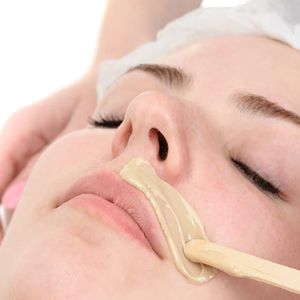
Wax Treatment
Eye Brows, Upper Lips, Under Arms, Half Arms, Full Arms, Half Legs, Full Leg, Bikini Lines, Brazilian's.

A Touch of Thai
Relaxing & Renewing. This experience starts with a special blend of Thai herbs used to deeply cleanse the skin to help the body to eliminate toxins and impurities. The massage with traditional Thai techniques is followed by a Thai herbal compress. A herbal scent soothes you into total relaxation.
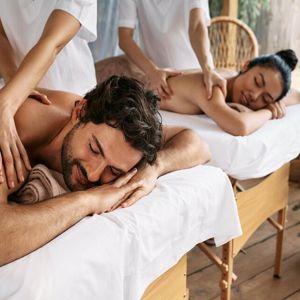
You & Me Package (for a couple)
The perfect package for a couple that does everything togather. Enjoy relaxation for two with a holistic approach, utilizing natural active ingredients from aromatic oils. Start the experience with the Romance Bath. By combining the effects of aromatic oil and a thorough relaxing body massage, you can feel tension melt away, as mind and body are brought back to the point of equilibrium.

Blend to Bliss package
Oriental Rhythm of Respiration. The luxury of time where you can unwind. You will begin your time in pampering heaven. An unforgettable spa experience, rhythm of respiration is performed by experienced therapists working in rhythmic harmony with you. The rhythm of this treatment, synchronized to your respiration, is performed using special products blended with oriental essential oils.
Angaga Island Resort & Spa is the home of SUB AQUA Dive Center in Maldives. You will find a full range of daily diving trips and PADI courses for all divers, whether at beginner level or more experienced.
Following an orientation dive, if you are an experienced diver, you can make unlimited dives on the house reef with your buddy (without guide). A guide can be provided for less experienced divers or for those without a dive buddy.
with famous dive sites such as Angaga Thila and “Kuda Rah Thila” all within easy reach by half day trip. Angaga Thila is just 7 minutes away by boat! There is also the famous whale shark trip where you can try your chances to dive with the biggest fish in the sea.
OPENING HOURS: 08:30 am – 20:30 pm and 14:30 pm – 18:30 pm
- Nitrox FREE of charge (to certified Nitrox Divers)
- Scuba diving programs for non-certified divers.
- PADI scuba diving courses from beginner to more experienced
- Unlimited Housereef diving
- Experience FLUO-diving and night diving
- Experience "manta madness" during manta season
- Equipment Rental available @ Daily and Weekly rates
- Small Diving Groups
Introduction to Snorkeling
If you are new to snorkelling or are not a conident swimmer, for your safety please consider taking a short snorkeling lesson, before trying to snorkel on your own or joining a boat snorkeling excursion.
Make a visit to the Dive Center to book your lesson, daily from 08:30 to 12:30 and 14:30 to 18:30.
• Lesson duration: approximately 1 hour. • Equipment included: mask, snorkel, ins and life vest.
- Part 1: briefing at the Dive Center, including equipment adjustment and proper use, snorkeling techniques and safety precautions;
- Part 2: practice with instructor in lagoon. Water skills include loating and swimming techniques, mask and snorkel clearing, among others.
- Cost: $30 per person, minimum 2 participants.
House Reef Marine Life
On the ANGAGA Island’s beautiful house reef you will see many creatures, including reef sharks. The two most common sharks here are blacktip and whitetip reef sharks. Both are non-agressive, and not dangerous to humans. They might swim by or even around snorkelers: this is a natural behaviour. Remain calm, and enjoy the encounter with these magnificent animals!
A responsible snorkeler WILL NOT TO TOUCH OR CHASE ANY ANIMALS, AND WILL NOT COLLECT ANYTHING from the ocean.
Snorkeling Equipment Rental
Snorkeling Set: mask+snorkel+ins, $10 per day
- Snorkeling mask: $4 per day.
- Snorkel: $3 per day.
- Fins: $5 per day .
- Life Vest: $5 per day
Rental conditions:
- All inclusive guests may pick up complimentary snorkeling equipment at the reception. Equipment rented from the Dive Center is always chargeable.
- The bill will be sent to reception, to be paid at check-out from the resort.
- Lost or damaged equipment will be charged for, as described on the price list.
- Do not stand on, kick with your ins or touch with your hands the corals or any marine life, to avoid damaging them and yourself!
- If you are new to snorkeling, please consider taking a short Introduction to Snorkeling lesson with our instructors (see previous page in this booklet).
If you enjoy snorkeling, WHY NOT TRY DIVING?

Take home the best souvenir! Share the beauty of the underwater world with your friends and family!
• Very easy to use, with a large, bright screen
• Takes high quality photos and HD video
• Suitable for snorkeling and diving
• Rental for up to 3 hours: $30 • Rental for up to 8 hours: $50 (until 18:00)
Rental conditions:
- Before renting, please check with the staff that the camera is well sealed and there are no leaks.
- When not using, store it in the shade, or cover it with a towel. Never leave it in direct sunlight or on the sand.
- Do not open the housing! The housing can be opened by dive center staff only.
- Rental hours must be consecutive. Please return the camera before 18:00 to the dive center – do not keep overnight.
- Lost / damaged camera or housing will be charged up to $700
How will you get your photos?
- You can bring your own SD memory card to use in the camera.
- Or, dive-centre can copy your photos on to your computer or USB stick.
- If you do not have any storage device, dive-centre can burn a DVD for you
Do your first real dive in just 2 hours
- STEP ONE: detailed and practical briefing by the instructors. Learn the basics to dive in safety and comfort. (30-45 minutes)
- STEP TWO: practice in the shallow lagoon. You will practice using the equipment and get comfortable with being underwater. (15-30 minutes)
- STEP THREE: swim out to the edge of the reef, go deeper and do a real dive on the Angaga Island house reef! Your instructor will be right next to you all the time. (30-45 minutes)
DIVING IS:
Safe. The professional instructors will always be with you. They take only small groups and adapt the program to each person’s abilities.
Easy. Most people find diving even easier than snorkeling, and the Instructors will always be there to help you.
- Fun! You will enjoy a unique feeling of weightlessness, and can get very close to the Live fish!
- Cost: $120 per person
- All prices mentioned are subject to 10% Service Charge and 12% GST tax
Try Diving Program Details:
- The program lasts about one and a half to two hours, and is offered daily at 09:00 or 15:00.
- For ages 8 to 99. The only prerequisite is to be reasonably healthy!
- You don’t have to be an expert snorkeler or even a very good swimmer to try diving, as your instructor will be there to help you all the time.
- You should not dive 24 hours before your international light, so do not leave diving for the last day of your stay.
- Reservation is required and can be made during opening hours at the Dive Center

In many parts of the world, a “try dive” consists of a 5-minute explanation, and large groups with no personalized attention from the guides, resulting in bad experiences or ear injuries.
At SUB AQUA DiveCenter, they take only few people at a time, and they spend ample time both on land, explaining the “dos and dont’s” and answering your questions, as in the shallow lagoon, where they make sure you are at ease before going any deeper.
Once start the dive on the house reef, they will stay very close to you, and adapt the dive to your abilities and comfort level. They will do everything possible to make sure your first experience with diving is a memorable one.
Frequently Asked Questions
SNORKELING & SCUBA DIVING
I can’t swim. Can I still try scuba diving?
Yes you can! You can do SUB AQUA Dive Center’s try diving program, called ‘Discover Scuba.’
We do recommend that you are at least comfortable in the water but an instructor will be with you 100% of the time and assists you in every way so that you can simply relax, breathe and enjoy the amazing underwater world that Maldives has to offer.
The try dive program is not a certification and you will not get your scuba diving license from this but you will experience the thrill of scuba diving in the Maldives, and being underwater close-up to beautiful fish and corals!
You must be able to swim if you want to complete your certification and learn to dive with the PADI Open Water Diver course.
Do I need to be a good swimmer to learn scuba diving?
No! As explained above, non-swimmers can experience scuba diving safely and do, every day, with a try diving program called, ‘Discover Scuba’.
However, if you want to complete your PADI certification to become a PADI Open Water Diver then you must be able to swim a distance of 200m without any flotation aid. This is an un-timed assessment, but you must be able to complete the swimming distance of 200m without stopping!
What do I need to learn scuba diving? Am I fit?
You need to be aged 10 years or above and you must be medically fit. You can download the PADI medical questionnaire here. You must be able to answer ‘no’ to all questions! If you must answer ‘yes’ to one or more questions on the PADI medical questionnaire then you need a certificate from your Doctor confirming your fitness to dive before we can take you scuba diving.
Can I take photos underwater?
Yes. Absolutely you should record your Maldives scuba diving experience on camera to share with friends and family!
SUB AQUA DiveCenter offer a digital underwater camera rental service or if you have an underwater camera of your own, please bring it with you. However, please be cautious. Breathing underwater and staying safe is a priority – capturing your experience on camera should only come AFTER you are feeling comfortable.
How old does my child have to be to try scuba diving?
A special try diving program for kids is the Bubblemaker program and this starts from age 8 with a maximum depth limitation of just 2 metres on the first dive.
For all other divers trying scuba for the first time, the minimum age is 10 years old
How deep will I go?
If it is your first time diving you will start in water you can still stand up in! Simply put your face in the water and breath. Remember, your PADI Instructor will be right beside you so you have nothing to fear.
You may go up to 6 metres depth on your first dive. If you decide you want to make more dives, they can take you diving again but without completing the full PADI Open Water Diver course, your maximum depth limit will be 12 metres.
If you want to go deeper than 12 metres then you should sign up to complete your PADI Open Water Diver Course!
The maximum depth limit for all divers in Maldives is 30 metres.
Is diving safe?
Absolutely and at SUB AQUA DiveCenter, safety is a top priority. With any water sport there are inherent risks and this is why we ask you to complete a short medical questionnaire before you take part in any scuba diving activity.
This medical statement is to be read and signed by you, stating whether you have any pre-existing medical conditions that might stop you from scuba diving. You will not need to bring a medical certificate with you unless you think you may have medical conditions that prevet you from diving.
In this case, make sure your Doctor signs the medical statement to confirm that you are fit to dive before you arrive.
Can I scuba dive with Asthma?
Asthma is classed as a pre-existing medical condition. Some people with asthma do still enjoy scuba diving but you must obtain a signed medical certificate from your Doctor stating that you are fit to dive if this is the case. Bring it with you on holiday or we won’t be able to take you diving!
Do I need diving insurance?
Divers should ensure that their travel insurance covers them for scuba diving activities. More recommendations for diving insurance can be found here.
Will I see a whale shark?
They do make full day diving trips to the outer reef of South-Ari Atoll where whale sharks are frequently seen. However this is the ocean and they cannot guarantee!
Will I see manta rays?
December to March is the best time to see manta rays in the area but we see them regularly throughout the year. Again, no guarantee!
How is the house reef?
Angaga Island has one of the best house reefs in the Maldives. All coral reefs in the Maldives suffered from the bleaching episode of 2015-16 but SUB AQUA DiveCenter have been working hard to conserve the reef and have also developed a coral restoration project that is doing well. You can see the new coral nursery growing when you are diving and snorkeling on the house reef at Angaga Island!

